Joyce T. Strand's Blog, page 23
October 21, 2013
CHECK IT OUT: Book Tour THE WITCH'S SALVATION by Francesca Pelaccia
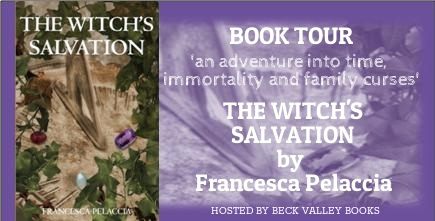
 A witch who demands humanity.
A witch who demands humanity.
The immortal families who denied her of it.
Two mortals commanded to right the wrong.
That is the fate of the urban princess Anasztasia and the renegade prince Matthias, born shockingly mortal to two immortal families. If they go back in time and restore the witch’s humanity, she will grant them immortality. She will also break a 550 year-old curse that imprisons Matthias’s family in their ancestral homeland and exiles Anasztasia’s family from it.
But to make their lives their own, the heirs must return to the most dangerous day in their families’ past, Easter Sunday, 1457. This is the day Vlad III, aka Dracula, massacred all nobles and their families involved in the death of his father and older brother.
How can Anasztasia and Matthias reverse the past when their families will not speak of their wrongs? How can they refuse when the witch owns their lives?
The Witch’s Salvation is a time-travel fantasy weaved around myth, historical fact, and a whole lot of creative license.
Buy the book from..... Amazon.co.uk Amazon.com Barnes and Noble

Francesca Cesario Pelaccia grew up in Toronto, Canada, and went to the University of Toronto, where she studied English literature. She started her working career moving in and out of teaching and corporate editing and publishing before settling on teaching adults English as a Second Language.
The Witch’s Salvation is Francesca’s first published novel. She has many other manuscripts in various stages of completion and genres gathering dust on her bookshelves. But it was not until The Witch’s Salvation that she “found her voice”. Francesca lives just outside Toronto with her family. She is working on the second book of the Witch’s trilogy, entitled, The Witch’s Monastery.
Follow the Author Website Facebook Twitter
Goodreads
 Follow the Book Tour
Follow the Book Tour
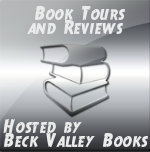
printed book ebook version
Published on October 21, 2013 15:26
October 10, 2013
WHAT THE EXPERTS SAY: Author Louis Kirby, MD
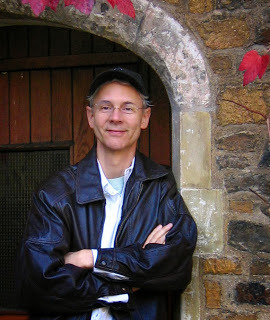 Louis Kirby, Author
Louis Kirby, AuthorSHADOW OF EDENAuthor Louis Kirby, MD, has written SHADOW OF EDEN, a medical thriller described by a reviewer as “a rat-a-tat triangulated tale of medical murder, corporate greed, political complexity, and international intrigue woven seamlessly around Dr. Steve James—an everyday-kind-of-guy.” I confess: that review got to me, and I am looking forward to meeting Dr. Steve James.
As a physician, Kirby specialized in the research and treatment of neurodegenerative diseases. He also has co-founded a company, Zetta Science. On the personal side, he spends time with his wife and daughter and hikes as often as possible including twice a year at the Grand Canyon.
Don’t miss the excerpt at the end of his interview – a falling Boeing 747 with no pilot can really get a book off to a fast start!
Q: Reviewer after reviewer praises your “heart thumping” action scenes in your medical thriller SHADOW OF EDEN. How do you create such suspense?
Louis Kirby: I think generating suspense involves a creative interaction between both the reader and writer. As a writer, I respect the reader’s intellect. They can figure things out which gives me the freedom to move the story ahead at a rapid pace, dropping clues and bits of information as I go. I also must create characters that the reader believes and cares about; only then will a tense situation really engage the reader.
If I have succeeded thus far, then I create situations that are credible and populate them with real threats. This can be a dangerous killer sniffing a trail or a political impasse with lives at stake. I also build the basis for the conflict ahead of time so they are anticipated and savored. Lastly, I let the reader believe that anyone is expendable in some fashion. There is no free Get Out of Jail card for any of the characters. Since it is not a series, even the main character is in real peril.
In addition, the antagonists must also be palpably real. They have frustrations, setbacks, challenges, and triumphs like any of us, yet they pose real threats and risks for the protagonists. And I let the reader see these aspects of the antagonists. I believe knowing them at an intimate level makes their actions believable and, consequently, manifestly threatening. So when the action starts, and there is quite a lot sprinkled throughout the book, the reader is fully along for the ride.
Lastly, there is the craft. How do you pace the build up? How do you drop hints as to what is to come? How do you stage the encounter? And can you write in such a way that the writing does not get in the way of the action?
Q: Your reviewers cite your ability to realistically combine your knowledge of medicine as an MD with fast-paced action. How relevant is credibility to creating a thriller? What kind of research did you conduct for SHADOW OF EDEN to make it a plausible story?
Louis Kirby: It comes back to respect of the reader. I have an opportunity to teach some very interesting science and medicine but do it in a way that serves the story and intrigues the reader. Accuracy is key. I want my readers looking up things I drop into the story to confirm that what they just read is actually true. And they are.
In the thriller genre I can’t just pawn off some half-baked science that is disconnected from the reader’s knowledge and experience. That would be science fiction or fantasy and my readers would instantly smell it and move on. My advantage is my scientific and medical expertise and I know what is scientifically and medically real. The art is how to push the boundaries in a way that serves the story while staying true to the science. I had a number of experts review the book to comment on its accuracy. Some scientists actually got ideas from my manuscript that they subsequently began to test in the laboratory.
Yet I don’t let the science take over the narrative. I wove it in so the needed information was doled out naturally and gradually. I don’t want anyone falling asleep during a science lecture!
The non-medical research was both challenging and fascinating. For example, I talked my way into the cockpit of a 747 flying over the Atlantic Ocean. Another time I spent a day with the former navy top gun pilot, aircraft carrier captain and fleet admiral asking him questions and soaking up the answers. Of course I read copiously and had more subject matter experts read the manuscript to ensure accuracy.
Q: Why do readers accept your character Dr. Steve James, an “everyday-kind-of-guy,” as a plausible hero in a world of intrigue?
Louis Kirby: I am a bit tired reading about these super-trained, super macho, best in their class, special forces bad ass guys who are ex-FBI/CIA/Black ops/Delta Force clones who you expect will prevail in any encounter with another baddie. Where’s interest in that? I certainly cannot relate on a personal level. My interest is in the ordinary guy faced with extraordinary circumstances. Don’t we all wonder how we’d react when confronted with a threat to our family or our lives?
So Dr. James is a guy who likes to mountain bike and teach his kid how to make paper airplanes. Fighting off well-conceived attacks on him and his family is the farthest thing on his mind. Yet confront it he must.
But I don’t turn him into a superhero. He knows when to get help and off he goes to find his ally: a damaged goods private investigator gone to flab who is not sure he wants to take the case. Can they prevail against a hit team that is well financed and trained? That’s an open question.
Q: Your reviewers compare you to some of my favorite authors, such as, David Baldacci, Michael Crichton, John Grisham. I’m curious. Do you read authors such as these? Did they influence your writing? How would you compare SHADOW OF EDEN to their writing?
Louis Kirby: Alas, I am afraid I must disappoint here. I can reel off a list of the name brand writers who I have enjoyed but few who actually influenced my writing. Three exceptions and I’m very clear about what they did to influence me. The best writing lessons I learned were from Syd Field’s Screenplay. (Confession: SHADOW OF EDEN was first written as a movie. The screenplay still sits on my shelf waiting for that call from Hollywood). He taught me the three-act approach to story telling; how to make the story visual, important in novels as well as screenplays; and brevity: get into a scene late and exit early. And it worked for me. SHADOW OF EDEN has interwoven narratives and it would soon become weighted down by excessive detail without the quick-in and quick-out approach.
James Patterson, the second author who influenced me and it was by his example of brevity as described by Sid Field. His technique of quick, short chapters is one I adopted in SHADOW OF EDEN.
The third is Michael Crichton. While I have reservations about his actual writing ability, he did know how to tell a tale with a lot of science built in and get the audience on board.
Q: I’m almost afraid to ask given the topic of SHADOW OF EDEN as a medical thriller involving the world of medicine and our government, but how or where did you conceive of the plot?
Louis Kirby: Like anything else, it was a kernel of an idea that, in a short week, blossomed into a full fledged plot. As a neurologist, I had been doing medical research in Alzheimer’s disease when I realized that most people had little or no understanding of the drug research and development process. The just magically showed up on the pharmacy shelves. The fact that we are able to take a unique molecule and safely introduce it to the body to achieve a measurable benefit is nothing short of amazing. Yet the process can be subverted. It is difficult and it is risky but with the billons of dollars at stake, it is also very tempting. It is a theme that I tell in SHADOW OF EDEN but attempt to make it almost a natural progression from that first questionable ethical lapse to the situation they find themselves in by the time the book starts.
From there, it was a tsunami of “What if…?” questions: What would be the worst side effect you could get (it’s a baddie and worse, it is very real). Who would you most like NOT to get the side effect…but does. And so forth. Then it was a matter of making the characters very real and their motivations very believable plus doing the research to give every aspect the authenticity it deserves.
Q: OK, I have to ask. What made you – a successful neurologist – decide to write a medical thriller?
Louis Kirby: It was a story that had to be told. I have inside information of several drug recalls. When one in particular was announced, we were still doing research on it. I had to call each of my study participants and tell them that the drug was being recalled. On one of those phone calls, I spoke to the wife. Her husband, who had been enrolled in the study, had died the previous week of precisely the condition that triggered the recall. There is real danger in drugs, in sloppy science and in pushing the limits of what is safe.
While I know some of the individuals involved in the decision making process, and they are thoughtful, decent people, the safety aspect nevertheless is abstract, reduced to an exercise trying to genuinely balance out the benefit of a drug against its potential to do harm. How difficult indeed is it to make these decisions! Now let’s add money into the mix and the decision becomes harder still.
SHADOW OF EDEN, in my mind is in some ways my story, told from the front lines of someone that has looked at the dangers at eye level, held the hands of those affected by real side effects yet one who has also seen the amazing good that can be achieved by a new and beneficial drug. I felt the real life consequences of ethical lapses could form the nucleus of a story that could be interesting, entertaining and informative at the same time. Didn’t Michael Crichton spend much of his career calling out the consequences of unchecked scientific hubris?
Q: Having worked in the biotech industry as a publicist for nearly 15 years, I am curious if you wrote SHADOW OF EDEN to deliver a message? Or were you mostly interested in entertaining your readers?
Louis Kirby: Clearly, there is a message but the message merely irritates if it is preachy or didactic. The drug aspect is only a part of the story not the story. I wrote a book that I would want to read. It is full of action, mystery, science, good people facing high stakes and insurmountable odds yet there are laugh out loud parts. I like a good story and I wanted to write a good story. So I’ll be more than satisfied if I entertain. I’ll be ecstatic if you think about the book days after you turn the last page.
Q: How do you define a villain? Are villains relevant in SHADOW OF EDEN?
Louis Kirby: Villains drive much of the story. I’ve tried to create really memorable villains, ones you can really hate, but because they are good at what they do, you have to respect them as well. The good guys are flawed and make mistakes as do the bad guys. They come complete with their back stories and understandable motivations. They get mad when things don’t go their way while impressing us with their cunning.
I’ve read enough thrillers to be impatient with cardboard baddies. Somehow being bad is a profession and there is a never ending host of them pouring out of Hell’s gates to rub their hands in cackling glee as they plot their next nefarious deed. Worse, without any explanation, they suddenly show up at the motel where our heroes are holed up. In SHADOW OF EDEN, you’ll know (although maybe not immediately) why and how. The pieces are all picked up or enough clues dropped so you can figure things out.
Q: What’s next?
Louis Kirby: I’m researching the next book. I may come back to Steve James later, but this next book is about a scientific expedition to find the biblical Tree of Life. Teaser: A recently translated Sumerian tablet gives credence to an earlier Garden of Eden tradition than the Genesis tale, one that describes harvesting an elixir from the trees of life and selling it to kings of the various lands so they might live for hundreds of years. Look at the ages of the descendents of Adam who all lived over 700 years until Noah, possibly about the time the supply of the elixir gave out.
The tablet also describes the one source of this elixir in the world destroyed by a vengeful god, lost forever in the sudden flood caused by worshiping the god of another tribe. But hidden on this tablet are clues as to where these trees grew and how a dedicated scientific team could find the genetic material of this tree to once again create an elixir of life.
Of course it is not so easy, but you’ll need to read the book to find out. (hint, they actually find it).
Q: Tell us about Dr. Louis Kirby. What do you like to do other than write or work? – assuming you have any spare time, that is!
Louis Kirby: In my professional life, I am starting a company to accelerate the pace of scientific innovation. You can read about it on ZettaScience.com. If it works it may be a catalyst for finding the answers to some of the big health and life science issues. I still consult on interesting drugs with biotech companies, some of whom have very promising leads targeting some very intractable neurologic conditions. Basically, I’m still an idealist wanting to do the next big thing. I really get to see a part the future as it unfolds.
In my personal life, I spend as much time as possible with my wife and daughter (who will leave for college in just over 2 years). She is learning how to drive so I’m also doing driver’s ed. duties. I hike the Grand Canyon twice a year, which is a great motivator to keep me in some sort of reasonable shape.
About Louis KirbyLouis Kirby specialized in research and treatment of neurodegenerative diseases and served as principal investigator on nearly 400 human clinical trials. He frequently spoke at national and international conferences on drug development and consulted on Alzheimer’s research for the government and the pharmaceutical industry. Throughout his life he has always been drawn to writing and has two other books in process. While in medical school he published several stories, one landing him in hot water with the Dean of Medicine. Louis lives, hikes and bikes in sunny Arizona.
About SHADOW OF EDEN
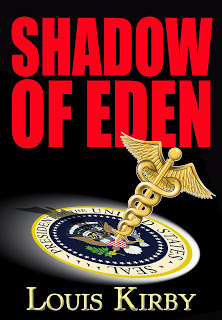
Chillingly plausible and terrifying. You’ll never take another pill without thinking of SHADOW OF EDEN. Peter Glassman MD, author of THE HELIOS RAIN.
Eden, the miraculous new weight loss drug, rips through a society intoxicated by the allure of attainable physical perfection. It is at once more ubiquitous than Tylenol and more fabled than Viagra . . . yet it harbors a deadly secret, putting millions at risk. Faced with the puzzle of a crazed airline pilot and a young woman with horrifying delusions, Dr. Steve James discovers Eden’s fatal flaw and suddenly finds himself, and his family, in the crosshairs of a determined assassin.
In Washington, D.C., bewildered White House staffers and Cabinet members scramble to cover up President Dixon’s alarmingly erratic behavior while managing an escalating confrontation with China. Dr. James, running from the relentless contract killer, realizes he alone may know what is wrong with the President—with less than twenty-four hours before war begins with China.
Beginning with a terrifying dive in a 747, through state of the art medical sleuthing, and high stakes political brinksmanship and calculating corporate treachery, SHADOW OF EDEN takes the reader on a non-stop, rollercoaster of intrigue, murder, corruption and sabotage.
Excerpt from SHADOW OF EDEN by Louis Kirby
The announcement awoke Steve James with a start. Irritated, he opened his eyes and saw an agitated male flight attendant standing at the front of the compartment. Gradually, he processed the words. He staggered to his feet and approached the flight attendant.“I’m a doctor—a neurologist, if that makes a difference.” “Perfect. Follow me.” Steve followed him into the dim cockpit. His eyes swiftly took in the condition of the two men. Jesus. Steve bent over the copilot. He found a strong carotid pulse and saw that the man’s breathing was normal. Steve’s fingers explored the bloody scalp and found two lacerations, but no skull depression.He glanced at Oliveros. “I think he’ll be okay.” He then turned to the pilot. “Sir, how are you?” The pilot looked at him through bloodshot eyes. “I thought I killed him. A goddamn flashback. Is he going to be . . . Marvin. Thank God.” A medium-built man in a pilot’s uniform had joined them. “What the hell happened?” “Captain Verness—” Oliveros began.“Never mind.” Verness snapped. “Ralph, it’s time to get out of here.” He pulled Steve towards the copilot. “Look after him.” Palmer’s right arm started shaking and his gaze turned glassy. To Steve, he looked like an actively hallucinating schizophrenic. “I’m hit. Fire! Fire!” Palmer yelled. He reached up and yanked all four fire extinguisher levers. “No!” Verness grabbed at Palmer’s hands but too late. The engines shut down. Lights flickered and alarms filled the cockpit. The plane’s abrupt slowing flung Verness into the center throttle console, slamming him into switches and knobs, including the overhead intercom button. “Help me out here!” Verness shouted, as he righted himself and grabbed Palmer from behind. Oliveros sprang to help. Steve hurriedly moved out of the way and leaned over the copilot’s seat.Palmer thrashed and punched as they pulled him out of his seat. “You can’t take me again, you bastards!” He kicked like a madman, knocking the control yoke forward. The floor of the cockpit plunged like an elevator with a snapped cable. Everyone flew upwards. Palmer, Oliveros, and Verness slammed their heads against the ceiling. Steve, bent over McElroy, smashed his back into the knob-laden ceiling, the metal switches puncturing and lacerating Steve’s back with knife-like agony. Gasping with the sudden pain, Steve twisted to dislodge the bits of metal from his back but the centrifugal forces of the diving jetliner still held him against the ceiling. And despite his pain, a single thought pierced through Steve’s mind. Who was flying the plane? Below him, he saw the empty seat where the pilot should be and, right underneath him, the still unconscious co-pilot. His gaze swept out the windshield and down past a break in the clouds. The distant lights were drawing closer with each moment. With horror, he suddenly understood. There was no one flying the plane. He twisted around, remembering the others. The other men floated in a tangle against the ceiling next to him. “Hey!” He grabbed the arm of the nearest man, the new pilot called Verness, and shook him. The arm was limp. As he looked closer, Steve realized the pilot was out cold. He looked at the others. They were all unconscious—or dead.
Links
AmazonWebsiteTwitter: @lou7is (the 7 is silent)Facebook Goodreads
Published on October 10, 2013 20:59
October 7, 2013
CHECK IT OUT: Seven Bestselling Novels DESPERATE ACTS for $.99
7--Yes! SEVEN BESTSELLING AUTHORS illuminate the dark, dangerous choices people make when everything that matters is on the line…
7 Bestselling full-length novels all for $.99--Yes! NINETY-NINE CENTS!
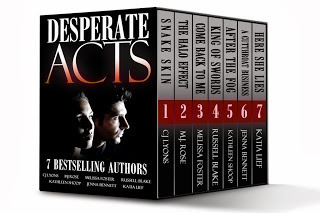
[image error] SEVEN FULL-LENGTH NOVELS in one collection, DESPERATE ACTS:
CJ Lyons, MJ Rose, Melissa Foster, Russell Blake, Kathleen Shoop, Jenna Bennett, and Katia Lief give you thrilling tales, erotic confessions, spine-tingling twists, smothering fog, family secrets, and unexpected loss all lead to DESPERATE ACTS.
BUY NOW AT THESE RETAILERS:
AMAZON KOBO B&N APPLE
Published on October 07, 2013 09:37
October 3, 2013
FunFamily TIPS: Writing Exercises for Family Entertainment
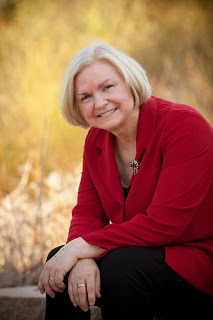 Joyce T. Strand, AuthorON MESSAGE and OPEN MEETINGSJillian Hillcrest MysteriesComing soon: FAIR DISCLOSUREIf you follow this blog, you are familiar with my FunFamily writing exercises based on the theory that writing can be fun and even therapeutic. To top that—you can have fun with the family doing brief exercises that will also help you develop some writing skills.
Joyce T. Strand, AuthorON MESSAGE and OPEN MEETINGSJillian Hillcrest MysteriesComing soon: FAIR DISCLOSUREIf you follow this blog, you are familiar with my FunFamily writing exercises based on the theory that writing can be fun and even therapeutic. To top that—you can have fun with the family doing brief exercises that will also help you develop some writing skills.
Following is a consolidated list of NEW and previously published suggested writing exercises. Enjoy – and if you have suggestions for other exercises, please add them in the comments.
Action· NEW! Write a paragraph about a birthday, anniversary, or other celebration describing activities you enjoyed. What did you like the most about it? See if your family can identify the event.
· You are on vacation with some down time between events—and some bored kids who believe they should be constantly on the move. Ask each family member to write a paragraph describing a favorite smell so far on vacation—without naming it. Other family members are to identify it. You can substitute favorite noise, sight, person, animal, parent, child, etc. Give a prize—an extra dessert at dinner, for example—for the one who correctly identifies the most subjects.
· Each member of the family is to write a paragraph describing what you do when you return from school, work, the supermarket, or wherever. Do you have a ritual? Do you throw your backpack on the floor? Do you get something to eat? Do you change your clothes? Then everyone is to print out your paragraph – assuming you’ve written it on your computer – and put it into a pile and choose an alternative to read aloud to the entire family. If you’ve handwritten it, be sure it’s legible. See if your family can guess which is yours. You might be surprised at their reactions!
· Write a paragraph about what happens in the morning getting ready for work (that includes homemakers) or school or writing a book etc. How many bathrooms do you have? Do you get up immediately when the alarm or mom calls? Do you run late? Read your paragraph aloud to the family. Be kind to your siblings!
· Describe what happens at your house when you get an unexpected call that some friends are planning to drop by. As a family, do you quickly scurry to pick up? Or, is your house always neat, but you wanted to finish just one more chore? Does everyone help? What do you do? Be sure to share your description with the family to see if they concur with your account.
· Write a paragraph about how you wake up in the morning. Does Mom have to shake you? Do you need to push the alarm multiple times on Snooze? Do you wake up before everyone else? If so, what do you do? If you have siblings, do you help get them up? Do you like waking up? How do you feel when you wake up.
Each member of the family – except the cook – is to write a paragraph about how the cook makes dinner. Describe the cook – is he/she in a hurry; enjoying the task; dressed in work clothes; etc. Then use at least 3 action verbs to tell us how the cook prepares dinner. Does he/she slide a pan onto the stove? Attack the microwave door to insert a frozen dinner? Pierce the cellophane package? Pounce on the potatoes? Finally describe the result – and be kind to the cook.
Dialogue· NEW! Listen to two or more toddlers talk to each other and then write a page or two of their dialogue. Family members should read it aloud.
· NEW! Write a dialogue between you at your current age and you when you were a child or teenager. What would you tell yourself? And what would your younger self remind you about?
· Write a page or more of dialogue based on your family at dinner. Read it aloud at the next family dinner exchanging roles, i.e., Dad should read Mom; Brother should read Sister. Take turns. It might be interesting to see if your conversations improve or decline.
· Write a page or two of dialogue spoken by your favorite action heroes without telling who they are. Family members are to identify them.
· Each member of the family is to write a page or two of dialogue of a conversation that you imagine two or more strangers are saying at a restaurant where you are enjoying a meal. The family should choose the people –discreetly, of course – even if it’s at McDonald’s. To make it more interesting, choose a genre, i.e., the dialogue is to tell a mystery, create a fantasy, deal with aliens, relate a romance, scare some zombies, or solve a life problem. Assign roles and then read the dialogues aloud.
Write a page or two of dialogue that occurred between you and one other person during your day--at school, at softball practice, at work, in the store, on the street, or while taking your driver's test. As you write the dialogue identify what started the conversation and what was your reaction to it: were you annoyed? Did you feel like someone punched you in the stomach? Were you short of breath? Elated? Concerned?
Character· NEW! write a paragraph describing an animated character. What kind of eyes, nose, ears does the character have? Does the character move quickly? How does it approach others? Is it friendly? Do you like this character? Why? Family to identify.
· Write a paragraph describing your favorite Super Hero without naming him. All family members to put their paragraphs into a pile. Draw one out that’s not yours and read it aloud. See if family can guess who it is. (Do not read your own, because your family will most likely know who your favorite hero is.)
· Each family member is to write a paragraph describing a character in a book—preferably one you’ve read. Try to incorporate how the character appears, smells, talks, walks, listens, rather than use words such as hero or villain. The other members are to identify the character. This exercise can be repeated with other characters in other books.
· Write a paragraph describing the happiest moment you ever experienced, such as, the first day of school (just kidding), meeting a best friend, getting new pet, greeting a family member whose been gone for an extended period of time, opening a special gift. Tell why it made you happy. Read your paragraph to your family. You might be surprised at their reactions.
· Write a paragraph describing how it feels to have the wind blow against your face; or the sun to shine on it; or bitter cold hit it; or rain. Remember to include each part of your face—your nose, eyes, mouth, cheeks, forehead, hair. And remember to include all the senses—smell, sound, sight, touch. Reward the author of the paragraph who includes the most senses and parts of the face.
· Write a paragraph describing a relative outside of your immediate family. Remember to recall more than just physical attributes: does he/she talk slowly or in staccato? Walk fast, talk with a mouth full of food, arch an eyebrow, laugh with a snort? Read your paragraph to the family to see if they can identify the person. Oh, and don’t be too negative!
Description· NEW! Write a paragraph about your favorite famous building or other landmark without identifying its
 location. Offer a physical description as well as an emotional one—why is it your favorite? Would you recommend others go see it? Why? Family to identify the site.
location. Offer a physical description as well as an emotional one—why is it your favorite? Would you recommend others go see it? Why? Family to identify the site.· Write a paragraph describing a restaurant and what you ordered—without identifying either the restaurant or the food. Tell how the restaurant and your food smelled (pungent), appeared (filled the plate), sounded (sizzling), and tasted (spicy, sweet). See if your family can guess which restaurant and what food you ordered.
· Write a paragraph describing a store where you bought something. Be sure to mention how the store smelled, what kind of sounds you heard, along with a physical description of the building. Tell why you bought the item. Read aloud your description to see if your family can guess which store – or type of store—you’re describing.
· Describe a new place you recently visited for the first time. Start with your first impressions of the place. Were you surprised at its appearance? Did it make you remember a forgotten experience? Were you afraid, intimidated, excited? Next describe the physical attributes of the location as an explanation of why you felt the way you did. Conclude with an explanation of how you felt when you departed the location. Were you still afraid, intimidated, excited? When you complete this description, read it to the family to see if they can guess the location.
Advanced· Write about: A boy enters a room with his sister. Assign a paragraph to each family member. Do not share your paragraphs until everyone is finished. Then read them in the following order: o Write a paragraph to describe the room: is it a jail, a hotel, exercise room, bedroom? Small? Large? Does it smell fragrant or pungent? What kind of furniture does it have? Is it a restaurant? Bar? Is it humid or dry?o A second family member to write a paragraph to describe the boy: physical description, clothes, approximate age. Is he lean, sweaty, out of breath? Is he wearing shoes or is he barefoot? o A third family member to describe the sister. Is she taller than her brother? What color is her hair? Does she look like a sister? Is she dressed stylishly? Is she sweaty and out-of-breath?o A fourth family member describes the action of entering the room: did the two run into the room? Did they appear frightened, worried, secretive, happy? Did they both appear the same as they entered the room? o If there are still other family members, write dialogue between the brother and sister. The brother wants to do something. The sister disagrees. The brother convinces her. They do the task and leave.o Additional family members can choose any of the above to write.o When you have all finished your paragraphs, read them aloud to the entire family in order. It should be an interesting story.
Published on October 03, 2013 08:38
September 17, 2013
WHAT THE EXPERTS SAY: Actor and Author, Stephen Jared
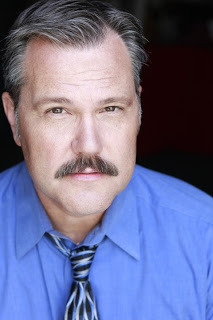 Stephen Jared, Author
Stephen Jared, AuthorTHE ELEPHANTS OF SHANGHAI
Author and actor Stephen Jared writes 1930s/1940s adventures and crime thrillers and also acts in many TV shows and movies, such as "He's Just Not That Into You." His latest novel, THE ELEPHANTS OF SHANGHAI, set in 1942, features Jack Hunter who uses his skills as a former actor to track down spies. A reviewer says, “Great writing, intriguing characters, solid historical background, snappy dialogues”
In his spare time, Stephen Jared likes to discover artists he never knew before, especially those from the first half of the 20th century. He has just finished his next novel, a crime fiction book set in 1930s Hollywood. At the same time, he maintains his acting career. His next acting gig is his appearance on a new ABC sitcom called “The Goldbergs,” which is scheduled to premier in a few weeks.
Be sure to check out the excerpt following his interview.
Q: What makes THE ELEPHANTS OF SHANGHAI “pulp action?”
Stephen Jared: That’s simply an effort to categorize the work. To me it serves no purpose aside from marketing. I don’t really think of my work as pulpy, don’t try to generate any kind of pulpy quality to my writing. What I write is, however, hugely influenced by the romantic adventures and noir movies of the 30s and 40s. A lot of those films originated from writers who got their start in the pulps – Dashiell Hammett and Rafael Sabatini, as example. The reason “pulp” gets thrown around is because it’s a particular style of literature, whereas “old Hollywood” doesn’t exist as a style of literature. Where I draw the line between pulp writing and old Hollywood writing is that I don’t write superhero stories.
Q: Your reviewers praise the action in THE ELEPHANTS OF SHANGHAI: “The flip-flops of the action are dizzying.” How do you create such “dizzying” action?
Stephen Jared: I had a lot of visual ideas I wanted to throw into this story – Chicago gangsters, a Chinese Warlord, a bombed and occupied Shanghai, a flying tiger, a sexy nightclub singer (I even managed to sneak Jimmy Stewart in there). You just can’t write a roughly forty-thousand-word story incorporating all of that without it taking a lot of fast twists and turns. The hard part is to keep it sensible and cohesive.
Q: A reviewer described your protagonist, Jack Hunter, “as a well developed character, imaginative and at the pencils edge of fiction and legend.” (I love that description!) How did you create Jack as a real person in a pulp action novel? How do you make readers care about him and what happens to him?
Stephen Jared: When Jack is first introduced he’s hung-over from drinking too much; the sunshine hurts, and when his butler mocks his acting – the work Jack is beloved for all over the world – Jack’s response is good-humored. So, we learn that he’s a guy with problems, and we learn that despite living like a king, he’s down-to-earth. That’s on page one. I just tried to create a character that had tremendous vulnerabilities, weaknesses, and then drop that character into an impossibly difficult situation where he had to become strong. In a sense, he had to grow up. I think that’s relatable.
Q: THE ELEPHANTS OF SHANGHAI is set in the 1940s. A reviewer was impressed with your “solid historical background.” What research did you conduct to assure accuracy? How important is this accuracy to create credibility and reader engagement?
Stephen Jared: I seek specificity more than accuracy. Specific detail provides believability; it grounds a story with a perceived reality. I write in settings and time periods I love, so research is fun for me. I did a lot of research on Shanghai – the hard part was deciding what to leave out.
Q: How relevant is the concept of “villain” versus “hero” to your story? What makes a great villain? An interesting hero? Could Jack be a hero without a villain?
Stephen Jared: These are, again, labels – heroes and villains – which don’t serve a hugely significant purpose to me. Look at Bogart in Casablanca; he was presented as a hero. They photographed him as a hero throughout. He was introduced as a hero; in his introductory shot we see him, and then a moment later we see his face. Heroes have been introduced this way for decades in film. Indiana Jones in Raiders of the Lost Ark was introduced this way. It’s dramatic trick. A brief second of a ‘man of mystery’ and then the big reveal. The whole bit where Bogart intercepts on behalf of the young couple, helping them get visas – Renault calls Bogart a sentimentalist, but the effect is really to tell the audience he’s a hero. It’s foreshadowing, but hardly a literary device without purpose; it lets the audience know this is a guy who may wallow in self-pity, but when he’s backed into a corner he does the right thing. He’s a hero. So, if he’s the hero, who’s the villain? He doesn’t beat the Nazis in the end. So, the villain could be the cynicism caused by heartbreak.
In other words, the villain of a story can be anything. What matters is conflict, and you can label the two sides of your conflict anything you want.
Q: Did you write THE ELEPHANTS OFSHANGHAI to entertain your readers? Or did you want to deliver a message to your readers? Both?
Stephen Jared: Entertainment is the goal, but not just gags; I build my stories around ideas that hopefully register with readers in some emotional way. THE ELEPHANTS OF SHANGHAI revolves around the difficulties associated with feelings of insignificance in life.
Q: In addition to being an author, you are also an accomplished and busy actor. Why did you decide to write novels? And why pulp action?
Stephen Jared: I wish I was busier as an actor – it’s tough out there. Over time, writing has become something I just get up and do. If I stopped – and I’ve wished to stop a few times – I wouldn’t know what to do with myself. I’m confident constructing stories. I’m momentarily released from all my worries and confusion about life. Maybe it’s a feeling of having control over something. I don’t know. Why pulp action? These 1930s/1940s adventures and crime thrillers are the type of stories where I feel I can offer something worthwhile. Other styles of literature, like vampire stories or Vatican conspiracy thrillers, are the type of stories I just wouldn’t be able to pull off.
Q: How important is humor to telling your story?
Stephen Jared: I think it depends on how deep into the realm of escapism you want to go. With stories like JACK AND THE JUNGLE LION and THE ELEPHANTS OF SHANGHAI there needs to be some levity, but with other stories the need lessons.
Q: What’s next?
Stephen Jared: I finished my next novel. It’s a return to crime fiction, this one set in Hollywood in the 1930s. It’s dark, grim, a smaller, more intimate story than anything else I’ve written. I think that’ll come out next year. As an actor, I shot a part on an episode of a new sitcom called The Goldbergs. It’ll be on ABC in a few weeks. The scripts are funny.
Q: Tell us something about Stephen Jared. What do you like to do when you’re not acting or writing?
Stephen Jared: I’m normally a little restless, always climbing the walls, looking for something to work on. I like visiting art museums. I’m a big fan of a lot of the painters of the first half of the last century. It’s fun to discover artists I never knew before. As example, over the summer I became acquainted with the works of Emil Kosa Jr. He painted Los Angeles cityscapes and landscapes back in the 1940s, also worked at 20thCentury Fox’s art department. I spend a lot of time exploring the past.
About Stephen JaredAs an actor, Stephen Jared appeared in feature films such as He's Just Not That Into You and on television in popular shows such as iCarly, as well as commercials for both radio and television. His writings have appeared in various publications. In 2010, his first novel, Jack and the Jungle Lion, received much critical praise, including an honorable mention in the 2011 Hollywood Book Festival (it is now a bonus book included in the purchase of The Elephants of Shanghai). Solstice Publishing released his second novel, Ten-A-Week Steale, in 2012. He lives in Pasadena, California, where he continues to work as both an actor and writer.
About THE ELEPHANTS OF SHANGHAI
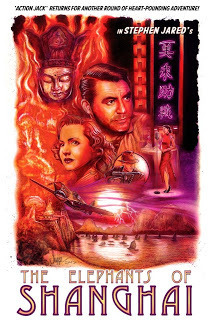 It’s 1942. With war raging, and millions of lives hanging in the balance, the world faces an urgent need for chin-up heroics. Having barely escaped South American headhunters in his last adventure, Jack Hunter seizes the chance to prove his courage. He uses “skills” picked up as a former actor so he can pretend to be a Chicago gangster and pursue spies collaborating with the mob.
It’s 1942. With war raging, and millions of lives hanging in the balance, the world faces an urgent need for chin-up heroics. Having barely escaped South American headhunters in his last adventure, Jack Hunter seizes the chance to prove his courage. He uses “skills” picked up as a former actor so he can pretend to be a Chicago gangster and pursue spies collaborating with the mob.A bold plan, however, is not always a clever plan, and when Jack goes missing hope falls on Maxine Daniels, the great love of his life, to pick up a trail that leads all the way to Shanghai, China. Once there, she finds Jack in a race against time involving priceless jewels, secret weapons, a mysterious Chinese singer, and a fiendish warlord.
It’s been five years since they survived the Amazon. This time Jack and Max set out to save more than each other – and end up facing a greater danger than they ever could have imagined.
Excerpt
Tightening talon-like fingers around his torch, Kyo Mingshu dragged the firelight closer to his bloodless visage, making a big show of his bestial grin. “The Elephants of Shanghai have significant symbolic value. The future belongs to the one who possesses them.” Abruptly walking off, his golden robe shimmering, he continued, “Come. I have treasures better suited for you.”Jack and Johnny aimed frustrated faces at Summer. She said nothing at all, simply turned and followed the Generalissimo, past the ancient throne and the clutter of antique punishments, through a door.A firelit hallway extended along several makeshift prison chambers. Armed with Tommy guns, Mongolian guards paced. One was a monster, easily seven feet tall. Corded muscles popped from necks and biceps; the sweaty bulk of all the guards visibly tightened with the presence of their leader.“The new Russians are not the only ones who honor cruelty,” Kyo Mingshu went on contentedly, his steps slowing with theatrical deliberation. “Imperial Japan. Nazi Germany.”Where was this going? Jack wondered. What had they walked into? Johnny crinkled his brow and licked dry lips, while Jack mashed the hairs rising on the back of his neck. They had hoped for a fast deal; now they only wanted to get out.“The future belongs to the wicked, not the weak,” Kyo Mingshu predicted. He stopped walking and took a Tommy gun from one of his henchmen. As if it had not been perfectly clear already, the devilish gaze he then presented to Jack and Johnny read as from a man who delighted in evil games. He seemed more creature than man, relishing an ability to spit poison.Summer stopped alongside him. Trailing her, Jack and Johnny soon reached the Generalissimo as well, expecting something horrible. Jack fixed his eyes upon the gun, wondering about Kyo’s intentions.A nod from the Generalissimo directed their attention within one of the prison chambers. Jack had begun to sense that their diversion to this long-ago abandoned factory, now altered into a macabre hideout, had less to do with precious stones and more to do with—who knew what? Unsure and totally unprepared for what they would discover, they each took a short breath and looked.
About JACK AND THE JUNGLE LION
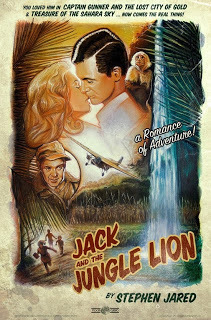
Battling giant snakes, poison pits and hostile headhunters after a plane crash in the Amazon, movie star Jack Hunter reveals himself to be something altogether different from the macho adventurer he plays in Hollywood. Luckily for him, he's marooned with movie-industry animal trainer Maxine Daniels and her two kids. The lovely "Max" has more than enough high-spirited courage and fiery determination to get them all home. But when terrifying natives capture the feisty heroine, fate calls on the handsome actor to become the hero he always pretended to be in pictures. With such daring demands on the two-fisted matinee hero, will Jack embark on a journey to win the heart of the woman he loves-or perish in the darkest jungles of the Amazon?
Links
Amazon Author PageWebsiteFacebookBook TrailerGoodreadsPinterest (Do you like old movie posters?) Twitter: @Stephen_Jared
Published on September 17, 2013 17:24
September 12, 2013
WHAT THE EXPERTS SAY: Author and Financial Manager Peter Sorrells
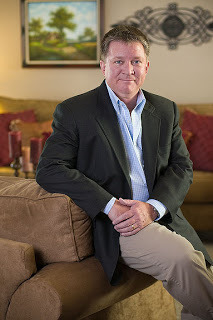 Peter Sorrells, Author
Peter Sorrells, Author100 WAYS TO SAVE & GROW YOUR MONEY
Peter Sorrells is an electrical engineer and holder of eight patents who learned about financial management the hard way—by making his own mistakes. His appreciation of the art of writing led him to pen 100 WAYS TO SAVE AND GROW YOUR MONEY: FINANCIAL FITNESS FOR REGULAR PEOPLE—his latest contribution to help us manage our money. Reviewers praise his ability to take complex financial concepts and make them understandable.
The son of a minister and teacher, Mr. Sorrells' religious beliefs help guide him in his writings—and his life. He enjoys spending time with his wife and three boys, riding motorcycles, and playing guitar.
Q: What drove you from a career as an electrical engineer in high-tech to writing books on financial management?
Peter Sorrells: When I was young, I enjoyed reading a lot, mostly fiction. I always loved how words go together to teach, uplift, and wring emotions out of a reader. And ever since college, I've enjoyed writing. Putting just the right words together, gives me the same satisfaction as creating something artistically/visually appealing. I spend too much time writing emails with too many words, and writing/rewriting Powerpoint presentations, for this reason. I appreciate so much reading other authors' work in books, articles, famous quotes, even song lyrics. I did not set out to be an author; it just sort of turned out that way.
In 1989, after a failed real estate event and other financial challenges, I set out to compile a list of money-saving ideas. That list grew into a book. But I didn’t publish it for two decades, though every few years I pulled out the manuscript and did some more editing.
In about 2005, while leading a small church group in my home, I wrote a short course and taught the group during two or three short sessions. That course was based, in part, on my earlier manuscript. I love teaching and loved seeing the light bulbs go on. And the epiphany for me, was that nobody knows this stuff coming out of a home and a high school. They still need to learn some basic concepts that will make a huge difference in their lives.
In 2009, after a much larger failed, giant real estate event which devastated our family finances, I rewrote and updated the draft of 100 Ways to help others avoid and recover from similar painful financial situations. It is absolute misery to be in financial hardship, with creditors calling all day and wondering how you'll make it to the next paycheck. Wondering if you'll lose your house, your car, your everything. I've been there, and wouldn't wish it on my worst enemy. Pressure like that causes stress, medical problems, marital problems, and sometimes spirals into more bad decisions. I put these books together to uplift & help as many people as possible.
Q: You have a background of international negotiation as part of your high-tech career. Can people from other countries apply your principles, or are they U.S.-centric?
Peter Sorrells: Anyone and everyone can apply them. My negotiations are based on treating people right, telling the truth, working toward agreement that satisfies the customer’s needs and protects my employer. I work to understand where the person across the table is coming from, what is needed and why. And I explain our position in terms they can understand, based on their own experience. If I can’t help them, I say so. I wrote more about this subject in The Humanity of Marketing Business-to-Business , an ebook published by ExecSense.
Q: Most of your reviewers for 100 WAYS TO SAVE AND GROW YOUR MONEY: FINANCIAL FITNESS FOR REGULAR PEOPLE claim that your methods take complex financial concepts and make them understandable. How do you simplify financial principles for us inept financial managers?
Peter Sorrells: I have been an inept financial manager! I have made more and larger financial mistakes than most people. Despite my best efforts and investing a lot of money in investment courses, I lost huge amounts of money. Meanwhile some of my friends, who used simple financial principles, kept and grew their money. And my mother and father, an elementary schoolteacher and the pastor of a small church, neither of whom ever earned a lot of money, saved and grew their money carefully. They put three of us kids through college and retired comfortably.
I made 100 Ways simple by breaking it into small pieces, easy steps that anyone can do. Could you buy brand B instead of Brand A, to save a dollar every few days? Could you take a lunch to work one day a week instead of eating out? Could you make a phone call to your credit card company, say a few specific words, to save hundreds of dollars in interest fees? Anyone can. Do that with a few ideas in the book, invest the savings at rates you can find in Getting 10% , and retire a millionaire.
Q: Although you hold eight patents and have a BS degree, you don’t seem to have any finance degrees. What makes you a credible author of books on financial management?
Peter Sorrells: Making lots of large mistakes and learning from them. And going back to basics, reviewing how my parents did it, learning from friends who did a better job than I did. Reviewing the mistakes I had made, figuring out how I could have done things differently. And using some pretty straightforward math to model the way the world works, to prove to myself that it can really be done. I’ve climbed out of a huge financial hole by using the concepts in this book. It is not really about finance; it’s about making small, specific life changes that drive big results over time. I’m more of an engineer that appreciates how the universe works, than a financial guru.
Q: Several of your reviewers said that they felt whole again after reading 100 WAYS; however, a few were critical of religious overtones. How important do you think some kind of belief or values system is for financial well-being?
Peter Sorrells: Many, many people have proven that money can be made in the absence of spiritual and mental health. Some very famous ones have ended up miserable, or dead early. They thought being wealthy and/or famous would make them happy, but we can see so many contrary examples. Belief in God, and/or a relationship with Him, is not necessary for making, saving, or growing money – the mathematical principles are sound either way. But the Bible contains a lot of wisdom on money management that is useful either way. And the small amount of life coaching and scripture that I wrote into this book, are there for another purpose: to help the reader into a successful life . For that, I believe we all need a higher power and a savior.
Q: How are your books different than others about personal financial management?
Peter Sorrells: Most finance books are about more general concepts or more complicated concepts – 100 Ways is the opposite. It is specific and simple. Sort of the way my brain works.
I’ve read the inch-thick financial books (er, started to – I’m not sure I finished any of them). Great books have been out there for years, but most Americans retire poor and depend on Social Security. I wanted to make things easy, an everyone’s guide that everyone can understand in a few minutes (hence the subtitle). And without investing weeks in a course or getting bogged down in complex financial terms or risky strategies. Then I published a small enough format that it wouldn’t be intimidating.
Q: What do you think is THE most important tip you can offer us everyday folks?
Peter Sorrells:
1. Set a goal.2. Spend less than you earn, every month. 3. Save/invest that money and don’t touch it.
It really is that simple; but you won’t believe me until you read the very real ways to do this.
Q: Who should read your books? Who are your targeted readers?
Peter Sorrells: 100 Ways been helpful to people of all ages, high school to retirement age. Families in their thirties, businessmen in their 40’s and 50’s, seniors living on social security, and it’s been used as curriculum in a high school life skills class with 17- and 18-year olds.
Q: What’s next? Are you planning to write additional books on this topic? Others?
Peter Sorrells: After some reviewers asked about the interest rates used in some of the examples in 100 Ways, I wrote a companion guide showing where and how to get those rates. That second book Getting 10%: Great Returns of 1%, 5%, 10 and More on Your Money is available as a Kindle ebook.
My next book will be a simple cookbook with a month of meals that can be made for less than a dollar.
After that… the answer to everything is “it depends”. I have a to-do list with dozens of titles that I plan to write, but they always take longer than I expect. I will probably write a few more money-saving books, but also have plans to write outside that genre in business, spiritual, and even fiction.
Q: Tell us about Pete Sorrells. What do you like to do when you’re not writing or working? Who are your favorite authors?
Peter Sorrells: I spend time with my wife and three boys, read, watch movies, exercise, play a variety of guitars onstage at small and large churches, ride motorcycles, and also enjoy shooting sports at two local ranges.
Some of my favorite authors:
1) Rick Warren, because his book The Purpose-Driven Life is such a powerful life changer, and his personal character is such a strong example.
2) Brian Tracy and Steve Chandler, whose practical teaching in books and audio helped me to crawl off dead center, break through the inertia of self pity and desperation, stand up and move forward again after a devastating financial disaster.
3) Todd Burpo, whose true story in Heaven is for Real gave me a fascinating glimpse into heaven.
About Peter Sorrells
Peter Sorrells holds eight patents and a Bachelor of Science in Electrical Engineering (BSEE) degree from the University of Arizona.He has held successful engineering, marketing, and management positions in a half dozen high-technology companies. His work has taken him to befriend and negotiate with the largest high-technology companies in the world, as far East as Singapore, Japan, Taiwan, and China. And as far West as Germany, the UK, France, Italy, Canada, and every corner of the USA. An entrepreneur and teacher at heart, he speaks to large and small audiences on technical, business, financial, and biblical subjects.
His first Amazon bestseller, 100 WAYS TO SAVE AND GROW YOUR MONEY: FINANCIAL FITNESS FOR REGULAR PEOPLE, was originally written in 1990 - but not published at that time. It was later updated based on new technology and new life experiences, and first published in late 2009. The work grew from Peter's personal education in two disastrous financial events, conquering and recovering from those challenges, and distilling that wisdom in an easy-to-read, practical guide to help others. Peter's love of teaching and helping others is evident in his writing style.
Peter contributed a chapter to Brian Tracy's new book, The Secret to Winning Big, which was released and hit the Amazon bestseller charts in November 2012. He also released his own second Kindle book on finding high investment interest rates. Getting 10%: Great Returns of 1%, 5%, 10% and More on Your Money was released in early December 2012.
Most comfortable in blue jeans and a T-shirt, Peter most loves spending time with his (very patient and understanding) wife and three boys. Self-described as a man with too many hobbies, he can be found coaching others in the financial ministry of his church, facilitating Financial Peace University groups, riding motorcycles, shooting a variety of firearms at the local range, and performing music on stages of some of the largest and smallest churches in Arizona (he plays the electric, acoustic, and bass guitars, writes music charts, and helps to MD the band).
Peter considers himself one of the luckiest and most blessed humans on earth, and meets each day with a list that's too big to finish.
About 100 WAYS TO SAVE AND GROW YOUR MONEY: FINANCIAL FITNESS FOR REGULAR PEOPLE

Packed with easy, step-by-step actions anyone can use to save and grow their money. Endorsed by young and old. Are you frustrated with the month left at the end of your money? Are you starting from zero with no money at all, or worse - starting with a load of debt? There is hope! Do you have a "why"? A goal that absolutely must happen? A dream vacation, new furniture, college tuition, new church building, big medical bill, or well-fed credit card debt that's outgrown all your other bills? This book is for you! Through simple and practical ideas and examples, you'll learn how to put money back into your pocket, purse and bank account regularly and safely. You can watch your debt shrink and your money grow month by month. It's easier than you think.
About GETTING 10%: GREAT RETURNS OF 1%, 5%, 10% ANDMORE ON YOUR MONEY
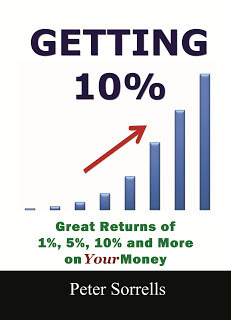
Downturns in the stock market and real estate in the last few years have made us afraid to invest in anything but an insured savings account or cash in a coffee can. But today's environment has driven bank savings accounts to such low interest rates, they're not much better than cash. Is it possible to get high interest rates in today's environment, when banks are paying 0.1% on savings accounts? Is it possible to find 1% without high minimums and penalties for withdrawal? What about 5% return? 10%? Yes! Even more than 10%. This Kindle book is dedicated to everyone that has ever lived with near-zero savings rates from the bank, while paying high service charges and high interest rates on loans and lines of credit… often to the same bank. And to anyone who's ready to start growing their nest egg at a much faster rate. In this book you'll learn where to look for those high rates, and some new ways of managing your money. Includes links to many resources. Over 6750 words. A companion to the larger book 100 Ways to Save and Grow Your Money: Financial Fitness for Regular People.
About THESECRET TO WINNING BIG (co-authored with Brian Tracy and other leaders)
The first man gets the oyster, the second the shell. ~ Andrew Carnegie Everyone loves to win, each in their own way for their own reasons. Winning means the position at the forefront of any endeavor. Winning Big is a term which expands this concept to define the impact of a 'significant' Win. Winning Big suggests a game-changing experience, a purposeful accomplishment that affects the way we are treated, as well as the outcome. How does anyone 'Win Big'? It usually starts with a determination of our goals. This may be referred to as our mindset, which indicates a measure of purpose. We move through stages of mindset to get to a position from which we can focus our actions to achieve our goals. The Celebrity Experts® in this volume have all done this. They propose to teach you mindset, methods and appropriate actions that can help propel you into the Winning Big circle. The hallmark of these authors is that they have 'been through the fire' themselves. They have endured the 'tempering' of their lives to get to this point of achievement. So you are not hearing from players that merely wish, speculate or plan, but from those who have acted, achieved, and Won Big! We all wish to be taught by the master, not by the apprentice. In this volume, these masters give you the opportunity to benefit from their knowledge. Follow them and they will mentor you from a position of strength. These Celebrity Experts® coach and teach... The Secret To Winning Big. The act of taking the first step is what separates the winners from the losers. ~ Brian Tracy
About THE HUMANITY OF MARKETING BUSINESS-TO-BUSINESS
Humans. We are a strange breed, complex and simple at the same time. Each of us is a bundle of needs, wants, goals, passions, joys, and pains both personal and professional. This is true of every single human being, making us all the same. But with a mix so unique, no two humans are alike. We tend to think of ourselves in these terms, each as an individual, and we work to highlight that individuality, striving for achievement, recognition, success, distinction. At any moment in time, someone around us is having their best day and someone else is having their worst. One just got a promotion, another was given a final warning before termination. One is at the peak of fitness, another is ill and weak. A new marriage, a new divorce. Life is happening to every single one of us, and everyone around us—including our co-workers and our customers. This book teaches how to treat those humans that work for our customers, negotiating with empathy and integrity while protecting our bottom line.
Links:
Getting10% (Kindle)
100 Ways (Paperback)
100 Ways (Kindle)
100 Ways Youtube trailer
Secret to Winning Big (Kindle)
Secret to Winning Big (hardcover)
The Humanity of Marketing Business to Business (Kindle)
Twitter: @PeterSorrells
Website
Published on September 12, 2013 20:03
September 10, 2013
CHECK IT OUT: New Romance from Melissa Foster
 Melissa Foster, Author
Melissa Foster, AuthorSISTERS IN LOVE
Cross-genre and international beset-selling author Melissa Foster introduces a new series of romance novels with SISTERS IN LOVE, an Amazon and B&N bestseller on the day of its release. Check it out.
JUST RELEASED! Sisters in Love (Snow Sisters, Book One: Love in Bloom series)
Love in Bloom…a contemporary romance series
Melissa Foster's SISTERS IN LOVE
“A beautiful story about love and self-growth and finding that balnce to happiness. Powerfully written and riveting from beginning to end.”National bestelling author, Jane Porter
“Steamy, passionate, and revealing. Perfect for readers of romances and stories about motivations and impulses that lead to emotional transitions.”Diane Donovan, Midwest Book Review
“If you are expecting a series of miscommunications and drama before the big payoff, this is not the story for you, for this is the tale of true grown up love.”Natasha Jackson, Readers’ Favorite
About SISTERS IN LOVE
Danica Snow has always been the smart, practical, and appropriate sister. As a therapist, she prides herself on making reasonable, conservative choices, even if a bit boring, and as part of the Big Sister program, she has little time for anything more in her life.
Blake Carter is a player. He never gets bored of conquering women, and with his sexy good looks and successful lifestyle, he has no trouble finding willing participants. When his friend and business partner dies in a tragic accident, he suddenly, desperately, wants to change his ways. The problem is, he doesn’t know how to stop doing what he does best.
When Blake walks into Danica’s office, the attraction between them is white hot, but Danica isn’t the type to give into the heat and risk her career. Danica’s desire sets her on a path of self-discovery, where she begins to question every decision she’s ever made. Just this once, Danica wants to indulge in the pleasures of life she’s been so willingly ignoring, but with her Little Sister in turmoil and her biological sister’s promiscuousness weighing heavily on her heart, she isn’t sure it’s the right time to set her desires free.
About Melissa Foster
Melissa Foster is an award-winning, International bestselling author. Her books have been recommended by USA Today's book blog, Hagerstown Magazine, The Patriot, and several other print venues. She is the founder of the Women’s Nest, a social and support community for women, the World Literary Café. When she's not writing, Melissa helps authors navigate the publishing industry through her author training programs on Fostering Success. Melissa has been published in Calgary’s Child Magazine, the Huffington Post, and Women Business Owners magazine. Melissa hosts an annual Aspiring Authors contest for children and has painted and donated several murals to The Hospital for Sick Children in Washington, DC. Melissa lives in Maryland with her family.
Click here for more information.Click here for excerpt.
Purchase links:Amazon B&N Nook
Published on September 10, 2013 12:17
September 4, 2013
WHAT THE EXPERTS SAY: Southern Poet and Novelist, Damon Marbut
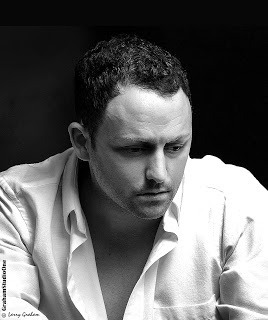 Damon Marbut, Author
Damon Marbut, AuthorLITTLE HUMAN ACCIDENTS
Photo by: Larry Graham
Southern Poet and Novelist Damon Marbut created a book of poems, LITTLE HUMAN ACCIDENTS, driven by events from a period in his life when he and friends deliberately lived to experience “conflict and struggle in order to best learn from it.” You may remember him from a previous guest post (“The ‘Me’ in Our Work” ) when we learned about his novel AWAKE IN THE MAD WORLD. Reviewers praise the qualities of candidness and redemption in LITTLE HUMAN ACCIDENTS. Mr. Marbut claims that candidness is vital, and redemption a reflection of his evolving “personally, creatively and professionally.”
In the following interview, Mr. Marbut explains why he writes both poetry and prose, and how each supports his writing. We also learn that he lives in New Orleans, where he enjoys the cuisine.
Don’t miss an excerpt from one of his poems, following the interview.
Q: Can you explain the title of your new book of poetry LITTLE HUMAN ACCIDENTS: CHAOS POEMS FROM THE BRINK? What are little human accidents and how do they bring us to chaos?
Damon Marbut: The title speaks to decisions and judgment calls I made in my mid-twenties that led to a more solid foundation of being at ease with my life as a developing and evolving writer. I didn’t want to admit to myself then that to stretch out into a professional career as a writer required as much sacrifice, focus and thick skin as it has proven to involve.
During the years these works were written, I was spending very intimate and intense moments with friends and colleagues (poets, novelists, literature scholars, philosophers) where we pushed ourselves and each other to live just enough in the margins of our obligations and responsibilities to be able to create and grow at all costs. It’s a daring notion, was reckless quite often and very emotional because we knew our time together was limited and that we were given the gift of that space in our lives to not have to care about money or major bills or much else beyond writing. We saw our group as a collective resource for growth and inspiration. But we really expanded to the edges of how far we could reach, with destructive drinking for some, excessive drug use for others, sex for others still.
So the book is a documentation of that time in our lives where we knowingly created conflict and struggle in order to best learn from it.
Q: You’ve also written a novel, AWAKE IN THE MAD WORLD. What can you say in poetry better than in prose? Do you prefer one over the other?
Damon Marbut: Poetry allows me to focus on seemingly tiny and/or minor snippets of an experience or moment and write solely about it in a reduced space, which in turn lends itself to a universality of its own that ultimately gives it more size. In prose, at least as far as I see it, I take a huge chunk of existence and character and take bigger license with a story as a more prolonged expression of message. I love them both equally, as they inform one another and my approach to how and when I write either.
Q: A reviewer sites “redemption” as key to your poetry. Do you agree? Why?
Damon Marbut: I saw that, and I agree. I was very grateful this was stated in a review, because even though the poems have occasional heavy tones of self-deprecation and alcoholic behaviors, I knew as we were living them and writing them that it was all fleeting. We simply knew we couldn’t and wouldn’t live like that indefinitely. I felt compelled to tell the story truthfully through poems regardless of what they might say of me when read by someone who never lived so torrentially like I did in my mid-twenties. I suppose the redemption discovered in the poems could come from the fact that I’ve continued to evolve personally, creatively and professionally, but at the same time there is evident affection and longing in the book that hopefully leads more readers to seeing that the lifestyle of that era was recognized as more educational than immutable.
Q: Your reviewers praise your candidness. How important is honesty to successful poetry?
Damon Marbut: I think it’s vital. In a smaller collection I’m hoping to have published next year, the display of honesty is written a little more indirectly due to different language choices (and poetry style) I use in them, but the honesty is still there. What strikes me most about poems I dislike is that they’re trying too hard to be poems, if that makes sense. It’s the same notion as being truthful and honest in your personal life. If you don’t lie, although you might have to defend your beliefs and perspectives you’ll nonetheless never have to worry about being called on a fabrication.
I think the candidness people picked up on in LITTLE HUMAN ACCIDENTS comes from, in part, my willingness to be vulnerable enough to come across as self-absorbed in some pieces, crude in others, and loving and inspired by others in different poems. If I wrote all of the same thing I suspect the character delivering the poems would be less believable.
Q: How do you define “successful” poetry? What do you consider the key elements?
Damon Marbut: It depends on what the poet is going for. I’ve written form poems, performance/slam pieces, confessional, narrative, etc. Whenever I committed to a certain style, whether it was for experimentation to determine what I like best for my poems or if it was just to “get out of my head” to grease the wheels a bit, I tried to do it with laser focus. And I guess that ties back in with honesty, too. Even if it’s out of your comfort zone, write it for what you think it is and learn from it. Don’t write “Daddy” as your own. Plath did that already.
Poetry can be successful if it finds its market no matter how tiny it is, as there’s no broad audience that likes all kinds. Some people are going to hate me and the voice of my poems and the poems themselves. Some will love them. Anything I write that helps even a minimal amount of people feel better equipped to express an emotion or write their own works due to having read me, that’s my success. I’m not foolish to look at this as a money game. That would have killed my work at the very beginning.
Q: Why do you write—either poetry or prose? What started you to write? Do you remember your first story or poem?
Damon Marbut: I was always an imaginative kid and had great encouragement from my librarian godmother, as well as many teachers. Sometimes the encouragement came from them just so I’d sit still in class and quit being a nuisance. “Here, Damon. You can do the lesson later. Why don’t you write me a poem about the zoo?”
The first story I recall writing was about a pair of birds who were competing in an Olympics-style event, and one was cheating and got caught and the good bird won. Maybe it was a fable. I was into having “Moral:…..” at the end of my stories when I was young. So yeah, probably a fable.
Q: From where do you draw your ideas for your writing?
Damon Marbut: It all usually starts with a voice, mine or a created one. Sometimes it’s a line, and that applies to either poetry or fiction (or even nonfiction, like the new collection of memoir/personal essays I’m working on currently). I don’t get in the way of it too often like I once did. Often I’ll write down a line of imagined dialogue or a description and let it alone for weeks or months. When I come back across it there’s a chance it can become anything, especially if my thoughts have stayed wrapped around it. For example, this nonfiction book started as a story I conceived of 6-8 months ago. 30,000 words later and I haven’t written that particular story yet.
Q: What’s next? Will you be writing more poetry or another novel?
Damon Marbut: I’m focusing on the nonfiction book for now. I’ll occasionally take a break from it and write a few poems, but with everything else I’ve got going on, including book reviews for major publishers, I should stick with one thing for a few months. Plus, I’ve a novel I finished 9 months ago that’s under review with a publisher now. And that small collection I mentioned earlier is a project. And I’m editing a coffee table book of photography right now, too. And I’ve been asked to work on an oral biography of a famous bartender in the French Quarter.
Q: Tell us something about Damon Marbut. What do you like to do when you’re not writing? Who are your favorite authors?
Damon Marbut: I live in New Orleans, so I love food. I work part-time in a busy café on Magazine Street and love the people I work with. My social life more or less comes from there, otherwise I stick pretty close to home.
My favorite authors are still some of the big names like Salinger, Baldwin, Morrison, Kerouac in smaller doses than when I was younger. But I like modern poets like Dorianne Laux and Sharon Olds and a new talent who I think is going to do very well for himself, a Canadian poet named Andrew Faulkner, whose collection I just reviewed recently. I may be able to meet him, which would be terrific, as the publisher of LITTLE HUMAN ACCIDENTS is Bareback Press in Canada and we’re going to a few book festivals in the fall once we release on September 1st.
About Damon Marbut
Damon Ferrell Marbut is a Southern novelist and poet who lives in New Orleans, Louisiana. He is author of the novel AWAKE IN THE MAD WORLD and the collection of poems, LITTLE HUMAN ACCIDENTS.
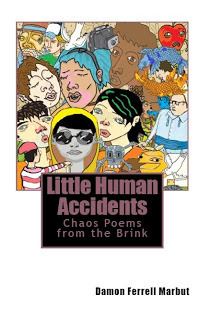
About LITTLE HUMAN ACCIDENTS
Damon Ferrell Marbut devastates the notion of apology in poetry with a tender recklessness in LITTLE HUMAN ACCIDENTS, poems that examine a personal evolution of sexuality and identity while treating the unavoidable step towards adulthood like a punching bag, especially in his free flowing self reflexive poems like Mornings Like This and So What.
Excerpt
Little Human Accidents
The nightmare keeps you up tonight,again, one you have each time it storms.My poetry scatters the floorall the way to the kitchen,
like a free-spirit sex train blew through—you leave them there for décor,love the way my poems smell in the house,but you can’t sleep.
On guard for me,are you? Since you found mebeneath the furniture in the hall,screaming, comatose, not knowing youwere there? Defending me from that?
Don’t.
I can turn the lamplight brighterand read you Billy Collins,
you’re so gentle,
leave the battling of nightmares to me.
Links
Amazon Author PagePublisher Website
Goodreads BlogFacebook Twitter: @dfmnola
Published on September 04, 2013 19:34
August 30, 2013
Coming Soon
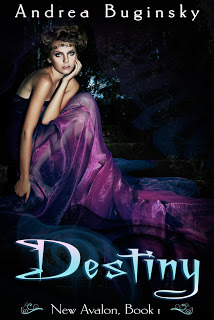
Constantly teased and taunted by the popular girls, Elena Baxter desperately wants to fit in. On her sweet sixteenth, she receives two shocking gifts: telekinesis and the surprising truth about her heritage. With high hopes that things will be different now, Elena returns to school to find that nothing has changed. Only this time her hurt feelings and frustration boil into something even she cannot understand.
When her powers explode, chaos ensues and she learns that her new ability is greater than she ever desired. As she learns to control her powers, Elena discovers there’s so much more to her heritage than she ever imagined.
ExcerptAs Elena bounded back up the stairs, her mom watched, smiling, thinking about the last 16 years, and of all this next one would bring. She knew there would be a lot of changes, more so than Elena could possibly know, and she was looking forward to every one of them. She could hardly wait for Isabel’s arrival the next day so they could finally tell Elena the truth about who she was, and help her to blossom and start to become whom she was meant to be.
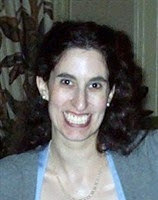 Andrea Buginsky is a freelance writer and author. “The Chosen,” a middle-grade fantasy novelette, was her first book, and was followed by “My Open Heart,” an autobiography about growing up with heart disease. “Nature’s Unbalance” is the second story in THE CHOSEN series. Andrea is currently working on another series: a YA fantasy. To learn more about Andrea, visit her on her website.
Andrea Buginsky is a freelance writer and author. “The Chosen,” a middle-grade fantasy novelette, was her first book, and was followed by “My Open Heart,” an autobiography about growing up with heart disease. “Nature’s Unbalance” is the second story in THE CHOSEN series. Andrea is currently working on another series: a YA fantasy. To learn more about Andrea, visit her on her website.
Published on August 30, 2013 23:02
August 29, 2013
WHAT THE EXPERTS SAY: Fantasy Author Mathew Bridle
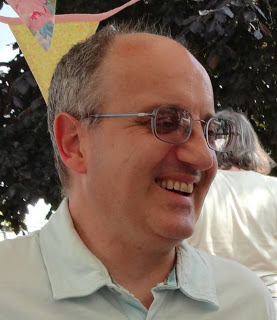 Mathew Bridle, Author
Mathew Bridle, AuthorYOUNG WARLOCK
Mathew Bridle has enjoyed reading fantasy since he was a child, so it is not surprising that he writes fantasy. His new book YOUNG WARLOCK—with more to come—is for young adults and, according to its author is “quite dark, some humorous—mostly though, a romp through my imagination.” As important, “It’s a story about learning to stand on your own two feet in a world filled with danger and adventure.”
Bridle is from the UK, has a wife and three children who occasionally allow him to play xbox, and likes to make people laugh. His 3-word description of himself is: balding, fat, and 50!
To really understand him, however, don’t miss the excerpt from his newest novel following this interview.
Q: Why do you write fantasy? Why do you find this genre appealing? What first attracted you to it?
Mathew Bridle: I have always been drawn to fantasy, even as child. I was always reading the latest copy of 2000 A.D. or my brother’s Marvel comics. I just love the freedom of imagination that fantasy has. My mind just runs riot, I see the worlds in my head as though I was there, like walking through a prophet’s vision. I’m then compelled to site and tell everyone about the wondrous things I’ve seen.
Q: Tell us about your most recent release, YOUNG WARLOCK. Who are your intended readers?
Mathew Bridle: YOUNG WARLOCKis for young adults. Some of the content is quite dark, some humorous—mostly though, a romp through my imagination. It has taken a few years to get it into shape and focus the story down to a few characters. Dekor, the young warlock in question, causes an awful lot of problems for himself, not all deliberately. He has to flee for his life and on that journey he begins to question himself about who he is and what he will become. It’s a story about learning to stand on your own two feet in a world filled with danger and adventure.
Q: When you write fantasy, how important is believability? How do you create a world that readers will embrace?
Mathew Bridle: Believability is crucial to me, even when I’m reading—if I cannot picture myself walking in the world which someone has created then I think how can anyone else do it. I like my characters to experience the good and the bad things in life. I want the world to exist around them and I want a lot to be going on in the world at large. I struggle with tightly focused stories where only a single character gets to experience it all.
Q: Why do your readers care about your characters?
Mathew Bridle: That’s tough to say. I do not create friendly, flawless people. Sure, there are good ones which I want you to like but I also want them to be real, so some part of their make-up must be flawed, but not always in an obvious manner. YOUNG WARLOCK is the beginning of a saga, so a lot of the content has to introduce future players together with the workings of the world in which they all exist.
Q: What makes a good villain? How relevant is the concept of hero vs villain in your books?
Mathew Bridle: A good villain, to me, is one who loves what he does, is what is, and does not necessarily need a reason. My bad guy, a half-troll-half-human warlock is doing what he’s doing for a very simple reason which I’m not revealing here. He is a cruel tyrant trapped in his own beliefs. He is however, not the only bad guy in this part of the saga. I have a few devious characters who play a larger part than first appears.
As in real life, people change sides or allegiances, or just get bored and fancy a change. Even good guys can be turned for a price.
Q: Do you write your books to deliver a message to your readers? Or are you writing purely for entertainment?
Mathew Bridle: I suppose there is message. Some early commentators thought there was one which is pro-religion, but most just read it for the purpose which I wrote it for—to entertain, to suspend reality.
Q: What made you want to be a writer?
Mathew Bridle: As a child, in primary school, I was always writing. I am blessed with an overactive imagination. I see stories in most everything I see and read. A tiny statement or line in a song can become a novel or a story.
Q: What is your greatest strength as a writer?
Mathew Bridle: I never run out of ideas, just time.
Q: What’s next?
Mathew Bridle: Next, is the sequel ‘Fire and Thorn’ I’m about 10 thousand words into it, though I have written 300 thousand words of future story line, so I have plenty more to come.
Q: Tell us about Mathew Bridle. What do you like to do when you’re not writing?
Mathew Bridle: I was recently asked to describe myself in 3 words: balding, fat and 50! I’m a bit on the crazy side always trying to get a laugh out of everything. I work at a day centre for adults with learning disabilities. I have three children and have been married for 18 years. I like to read; I’m currently reading The Wheel of Time by Robert Jordan; plenty of action in that one. I play xbox with my kids (when they let me) and watch as many movies as I can fit in, the last one being the new Wolverine movie.
About Mathew Bridle
Mathew Bridle was born in Horsham, West Sussex in 1963 where he spent the first 35 years of his life. Educated in state school, he barely scraped an ‘O’ level in English. He has tried his hand at many things even running his own graphic and web design company for 15 years until he had enough of not being paid. Now he works with adults with learning disabilities near his home in Crawley, just a few miles from his birthplace.
Over the years Mathew has written a handful novels, The Rising, Lagoon, 3 Phaze and Emun of Mor all of which are available free in ebook from most major book sites. Over the past three years there have been over 20 thousand downloads of his books. He is pleased with the general response to his early work acknowledging the fact that they are generally quite poorly written to which he responds ‘I left in their original state because it shows how I have developed as a writer. I am not at all worried how they are perceived so long as people enjoy reading them. I will leave them as they are’
He is currently working on the direct sequel to YOUNG WARLOCK, Fire and Thorn which follows the progress of Dekor as he embarks on a quest in the unchartered territory of Salzear and the lost troll tribes.
About YOUNG WARLOCK
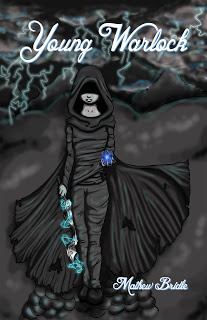
Compelled by his lust for the flame the young warlock is driven on a trail of destruction. Running from those he once trusted, he befriends a tattlejack, Icthus, whose gift of extracting the truth could become his greatest strength. Now all he needs to do is defeat his lust and prove his worth to all those who doubt him, including the young girl who is carrying his child. Only the old priest believes the boy, Dekor, to be something more than just another warlock.
The dogs of war are gathering. The undead seek allies among the enemy horde in the north in their bid to rout the mages, break the control of the Council of Twelve and take the land for themselves. Together the goblins and the undead set out to scourge the lands of Alzear of all who stand in their way.
The pieces of the prophecy are slowly cohering. The gods have chosen their warriors and the people have chosen their gods. War is coming, a war whose like we have never seen. The fate of an entire people may rest in the hands of a headstrong young man and his unborn child.
Excerpt
"Very dangerous," chirped a voice, startling Dekor who jumped to his feet. "Most dangerous indeed. Ice works best in water, not fire.""Who are you?" Dekor asked the green-skinned creature hunched in front of him. Its claws dug into the soft earth as it leaned closer to sniff him."Icthus. Who are you?" The creature shuffled nearer, water dripping from his smooth skin, reaching out to poke at Dekor's torn cloak."I am Dekor, from Mor." "More what?" Icthus brushed his skin with his long, spindly fingers. Blinking twice, his thick eyelids left a fresh coating of mucus over his bulbous eyes. His long pink, forked tongue flicked in and out of his broad mouth tasting the air."Mor is a place, a country." Dekor paused, twisting the toe of his boot into the soft earth, "My home." "On the run, are we?" Icthus padded around Dekor, surveying his island. "Wh... what makes you suggest that?" Dekor's words tumbled over his tongue. Icthus picked up a stick and began poking about in the soft soil. The spines on his back rose and fell with his breathing.Pulling a worm from the ground, Icthus responded, "You have no bags, no food, no weapons." He walked around Dekor checking his pockets and clothing.Dekor shrugged. "Yes, I am on the run." I have done some wrong things, some by accident, others not." Screwing up his face as Icthus flicked out his tongue snatching the fat worm from his own hand, Dekor shuddered."No one will find you here. No one comes here." Icthus walked back to his small hut made of sticks whose walls were splattered with handfuls of thick black mud. "Come in if you like, nothing will harm you here." They walked over to the small hut which stood on the shore of a large open expanse of water. "Does the marsh end here? As far as I can see there is more marshland to the east while a dark shadow obscures the horizon to the north. Everywhere else, there are swamps.” "Wall that way, cliffs that way," Icthus replied nonchalantly hopping up onto the veranda of his home. Dekor followed him inside. "What?" he asked, looking at Dekor's puzzled face."Nothing, your house is much larger than I expected it to be." Dekor's eyes roamed around the hut taking in the neatness of everything. Icthus responded, "I might be small, but my home does not have to be." Tipping his head to one side, he looked Dekor over from head to toe."Yes?""Where are you going in such a fine robe?" queried Icthus, reaching out to feel the fabric, "Exquisite is it not?" "Yes, but not originally mine." Dekor wished he could stop blurting out the truth. It was becoming an irritating habit. Icthus looked at him, smiling. "Problem with your tongue?" Icthus' smile broadened until his mouth had consumed the larger part of his face. Dekor's mouth became a thin line. "You know what is happening? How do you know?"
Author and Purchase LinksPurchase Links
E-Book versionSmashwords KoboAmazonUS AmazonUK Sony Barnes& NobleDiesel
Paperback versionPaperback
Author Links
Twitter: @mathewbridleFacebook Goodreads Linkedin Website
Published on August 29, 2013 18:58



